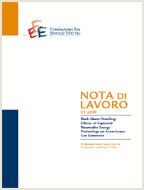Environmental Policy, Spatial Spillovers and the Emergence of Economic Agglomerations

01.01.2009
Efthymia Kyriakopoulou, Anastasios Xepapadeas
R3, Q5, H2
Agglomeration, Spatial Economics, Environmental Policy, Knowledge Spillovers, Transportation Cost
Climate Change and Sustainable Development
Carlo Carraro
We explain the spatial concentration of economic activity, in a model of economic geography, when the cost of environmental policy – which is increasing in the concentration of emissions – and an immobile production factor act as centrifugal forces, while positive knowledge spillovers and iceberg transportation costs act as centripetal forces. We study the agglomeration effects caused by trade-offs between centripetal and centrifugal forces. The above effects govern firms’ location decisions and as a result, they define the distribution of economic activity across space. We derive the rational expectations equilibrium and the social optimum, compare the outcomes and characterize the optimal spatial policies.
